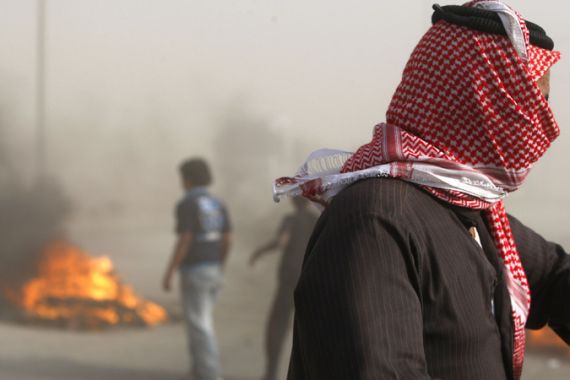Do Jordanians want reform or revolution?
The tiny, impoverished country is led by an unelected absolute monarch and is plagued by corruption and ethnic tensions.

It has a population of less than seven million, few natural resources of its own, and tends to rely on aid from its rich neighbours and its friends in the West in order to survive.
But a combination of geography and history has resulted in the Hashemite kingdom of Jordan playing a critical role in the politics of the Middle East and, especially, the Israel-Palestine conflict.
The global financial crisis, however, has hit the country hard and food prices have skyrocketed. Economic growth has halved and unemployment stands, officially, at 12 per cent and, unofficially, at between 25 and 30 per cent.
I travelled to Jordan to try to find out what the future holds for a country led by an unelected and absolute monarch, plagued by corruption and economic stagnation, and divided between ethnic Jordanians – the “East Bankers” – and the marginalised Palestinians – the “West Bankers” – who now make up a majority of the population.
But it isn’t just the Palestinians who are disgruntled – the opposition to the regime ranges from the “squeezed” middle classes, to former army generals, to the East Bank tribal leaders that the ruling royal family has traditionally relied on to staff the civil and intelligence services, to the local branch of the Muslim Brotherhood, the Islamic Action Front (IAF). The latter, the biggest and best-organised political group in Jordan, has yet to call for the royal family to go but continues to boycott elections and the country’s parliament. The IAF has been invigorated by the Brotherhood’s recent victory in the Egyptian presidential election and has since been wooed by a panicked regime.
The truth is that Jordan’s royal rulers have tended to use the country’s politicians and bureaucrats to deflect attention from their own failings; the four Hashemite kings have changed prime ministers almost 70 times since the establishment of modern Jordan in 1921 and the current king, Abdullah, has appointed 10 different prime ministers since coming to power in 1999 – three of them in the past 12 months alone. As I asked Mohammed Halaikah, a former deputy prime minister under Abdullah: Is there something wrong with every single Jordanian premier or perhaps something wrong with the king himself?
I was surprised, in fact, to find criticism of King Abdullah, and his wife, the glamorous Queen Rania, commonplace in Amman, the country’s capital – despite the fact that insulting the king is punishable by three years in prison. Abdullah, however, lacks the charisma and charm of his late father, Hussein; many Jordanians may continue to harbour a nationalist and Islamic attachment to their Hashemite ruling family but plenty of others, for example, openly mock the Western-educated monarch’s poor command of Arabic. Rania, who is of Palestinian descent, is particularly unpopular with the East Bankers and her lavish lifestyle and extravagant spending has prompted ominous comparisons with Marie Antoinette.
Lest we forget, however, tiny, impoverished Jordan is a key strategic ally of the US and one of only two Arab nations (the other being Egypt) to have signed a peace treaty with the state of Israel. If the Arab Spring were to spread to the Hashemite kingdom and the ruling family fell, after almost a century in power, it would have a massive, almost unquantifiable impact on the wider region and on the Muslim world as a whole.
The key question is: Do Jordanians want reform or revolution?
Watch The Cafe from Jordan at the following times on Al Jazeera English: Friday, July 27 at 2000GMT; Saturday, July 28 at 1200GMT; Sunday, July 29 at 0100GMT; and Monday, July 30 at 0600GMT. Click here for more on The Cafe.
Follow Mehdi Hasan on Twitter: @mehdirhasan
